Key takeaways:
- Stage fright is a common experience rooted in fear of judgment and self-doubt; understanding this shared struggle can alleviate pressure.
- Recognizing personal triggers and employing coping strategies, such as visualization and positive affirmations, are vital for managing performance anxiety.
- Building confidence through experience helps reduce fear; embracing mistakes can turn awkward moments into opportunities for connection with the audience.
- Practicing relaxation techniques, like progressive muscle relaxation and guided imagery, effectively calms nerves before performances.
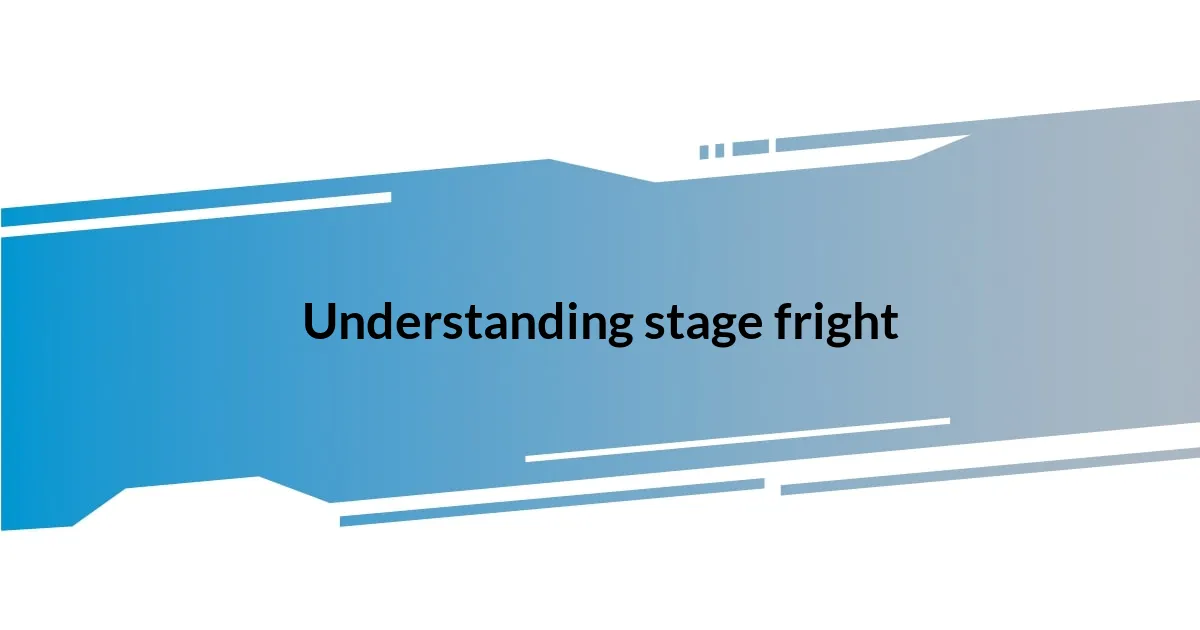
Understanding stage fright
Stage fright, or performance anxiety, hits many of us at unexpected moments. I remember standing backstage, my heart racing, the sound of my pulse drowning out the crowd’s anticipation. Have you ever felt that unbearable knot in your stomach just before stepping into the spotlight? That mix of excitement and fear is completely normal.
Understanding the roots of this anxiety can be enlightening. For me, it often stemmed from the fear of judgment—what if I forgot my lines or stumbled? I’ll never forget the time I flubbed a crucial line during a performance, and my mind raced with embarrassment afterward. It’s fascinating to reflect on how our minds can amplify these feelings, turning simple nerves into overwhelming panic.
Coping with stage fright involves recognizing that it’s not just a personal battle; it’s a shared experience. The very act of stepping onto that stage shows courage. When I remind myself that I’m not alone in this struggle, it alleviates some of the pressure. Have you ever stopped to think about how many others feel the same way? It’s this shared humanity that often brightens the path through anxiety.
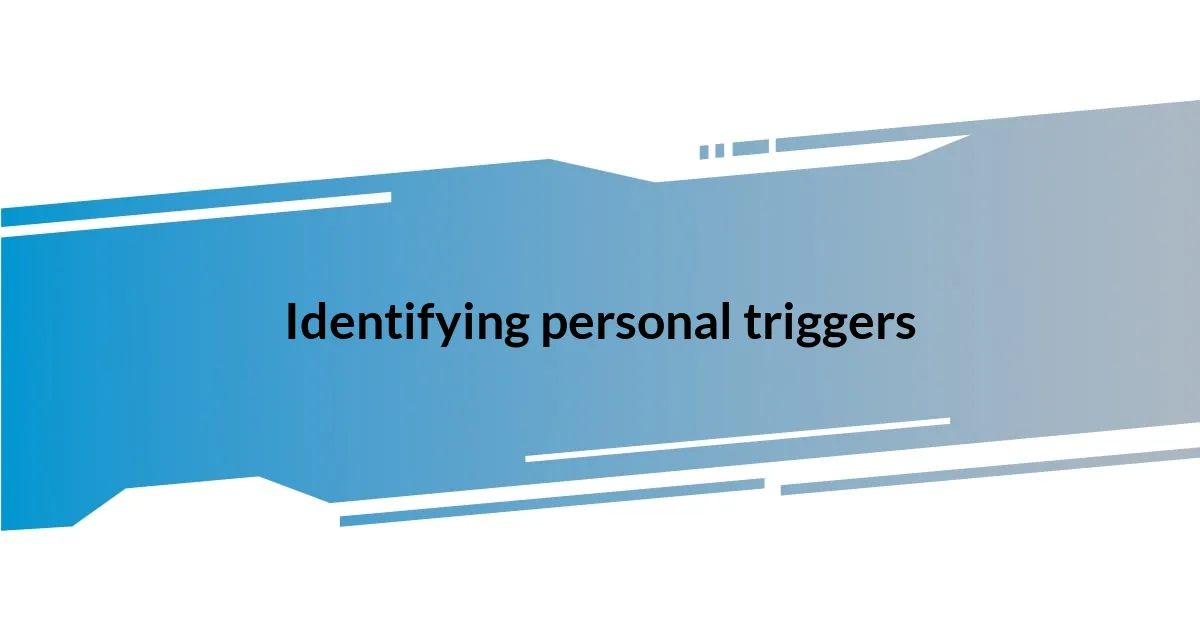
Identifying personal triggers
Identifying the personal triggers that spark my stage fright has been a transformative process. I’ve found that specific situations, like performing in front of large crowds or even facing a particularly critical audience, amplify my anxiety. For instance, one time, I had to speak in front of an auditorium filled with strangers, and I could feel my palms sweating just at the thought. Recognizing these scenarios has helped me strategize and focus on calming techniques that work for me.
Another critical aspect is understanding the emotional sensations that bubble up in these moments. I often experience a wave of self-doubt, especially when I compare myself to more seasoned performers. It’s easy to slip into a negative mindset, which only heightens the fear. I remember a time when I let an offhand comment from a fellow performer stick with me, and I battled that feeling of inferiority throughout my next performance. Now, I actively challenge those thoughts and remind myself that I bring my unique strengths to the table.
To deepen my self-awareness, I’ve developed a list of my personal triggers, mapping them out in a way that clearly outlines what I need to prepare for mentally. With this knowledge, I can better equip myself to handle those moments of anxiety. For example, when I know I’m facing a packed audience, preparing thoroughly beforehand and practicing visualization techniques have become my go-to methods for calming my nerves.
| Personal Triggers | Emotional Responses |
|---|---|
| Performing in front of large crowds | Panic and sweaty palms |
| Encountering critical audiences | Self-doubt and negative thoughts |
| Comparing myself to others | Feelings of inferiority |
| Unfamiliar venues | Insecurity and unease |
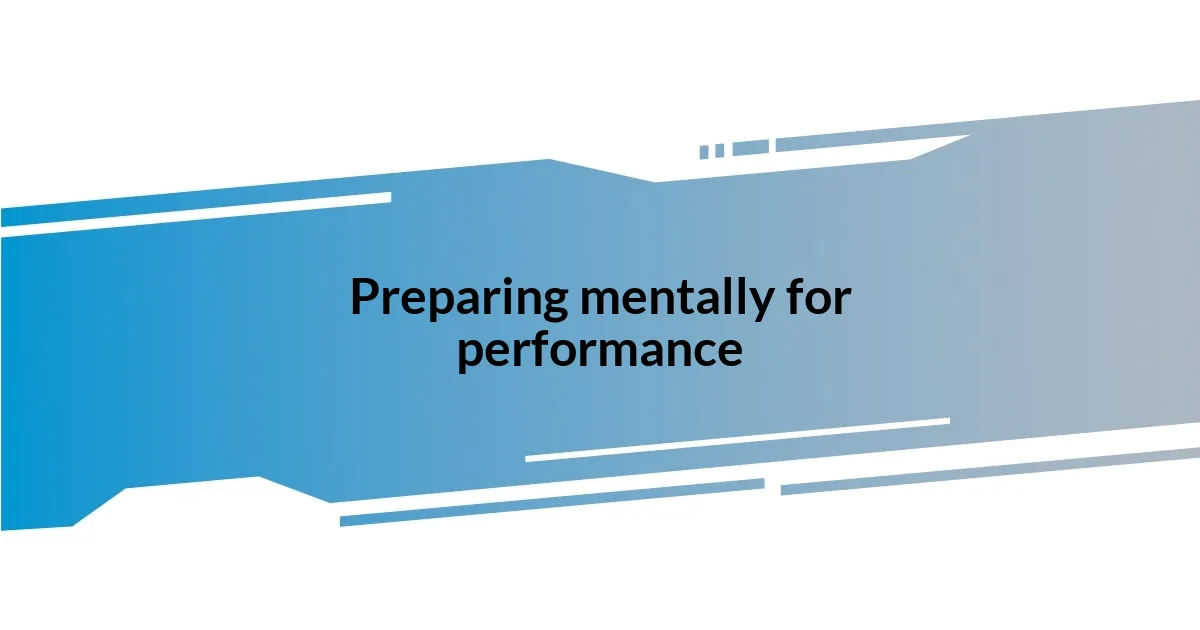
Preparing mentally for performance
Preparing mentally for a performance has become a crucial part of my routine. I’ve realized that visualization is one of my strongest allies. Before I step onto the stage, I often find a quiet corner where I can close my eyes and envision every detail—from my entrance to how I’ll connect with the audience. A few years ago, I had a particularly nerve-wracking performance, and visualizing the success of each moment helped ground me. It’s about creating a mental movie that lifts my spirits and reduces anxiety.
To further enhance my mental preparation, I also incorporate the following strategies:
– Positive Affirmations: I repeat simple affirmations that boost my confidence, such as, “I am prepared and capable.”
– Breathing Techniques: Deep breathing helps me center my thoughts and calm my racing heart before I perform.
– Routine Establishment: Developing a pre-performance ritual, like listening to a favorite song or doing gentle stretches, keeps me in a positive mindset.
– Familiarization: I familiarize myself with the performance space ahead of time, which helps ease any unease I might feel about unexpected surroundings.
– Mindfulness Practices: Practicing mindfulness allows me to stay present, blocking distractions and focusing on the moment at hand.
These methods have become my guiding light, transforming fear into empowerment as I prepare for my performances.
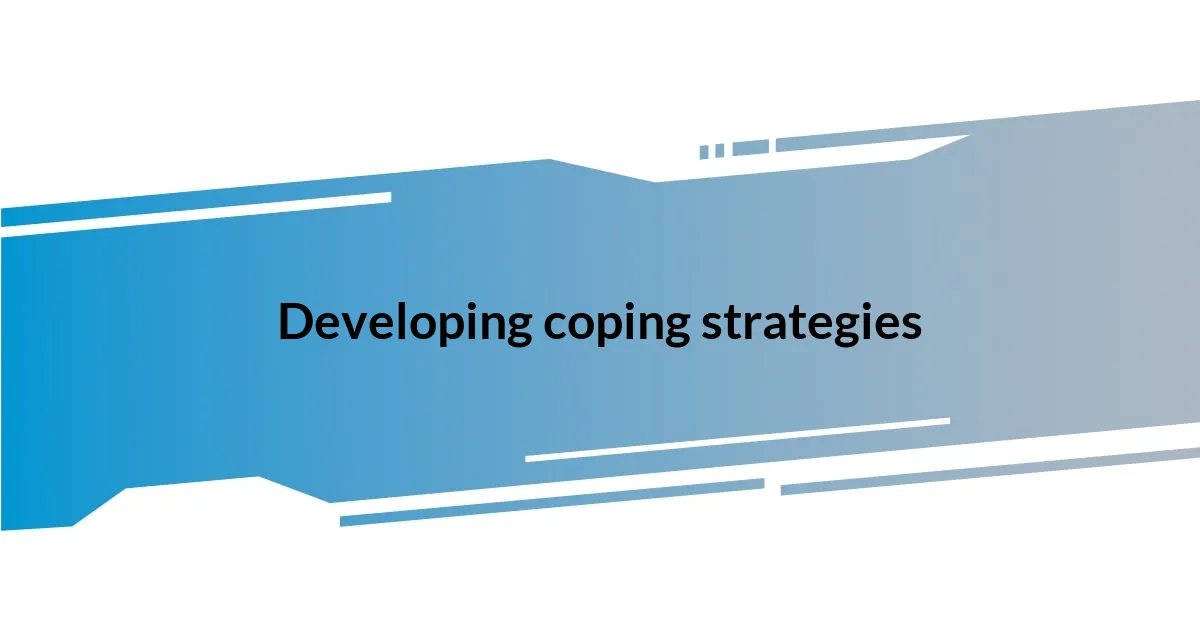
Developing coping strategies
Developing coping strategies is essential for tackling stage fright. One method that has worked wonders for me is creating a detailed checklist of what I need to do before taking the stage. I vividly remember a night when I forgot to check my equipment, and it unleashed a wave of panic. Now, I simply run through my list, mixing in physical tasks like adjusting my mic with mental affirmations—keeping myself sharp and focused.
Another approach I’ve adopted is embracing the power of connection with the audience. Instead of seeing them as intimidating strangers, I visualize them as supportive friends. This mental shift has made such a difference, especially during a standout moment when I caught the eye of a kind face in the crowd. Suddenly, the fear melted away. Have you ever experienced that, where one friendly smile can change your whole perspective?
Lastly, I’ve incorporated moments of reflection into my routine. After each performance, I take a few minutes to jot down how I felt and what worked well, celebrating the small wins. This not only helps me learn but also builds my confidence over time. Reflecting on my growth reminds me that every stumble is just a stepping stone to improvement, and that alone eases my nerves for the next time.
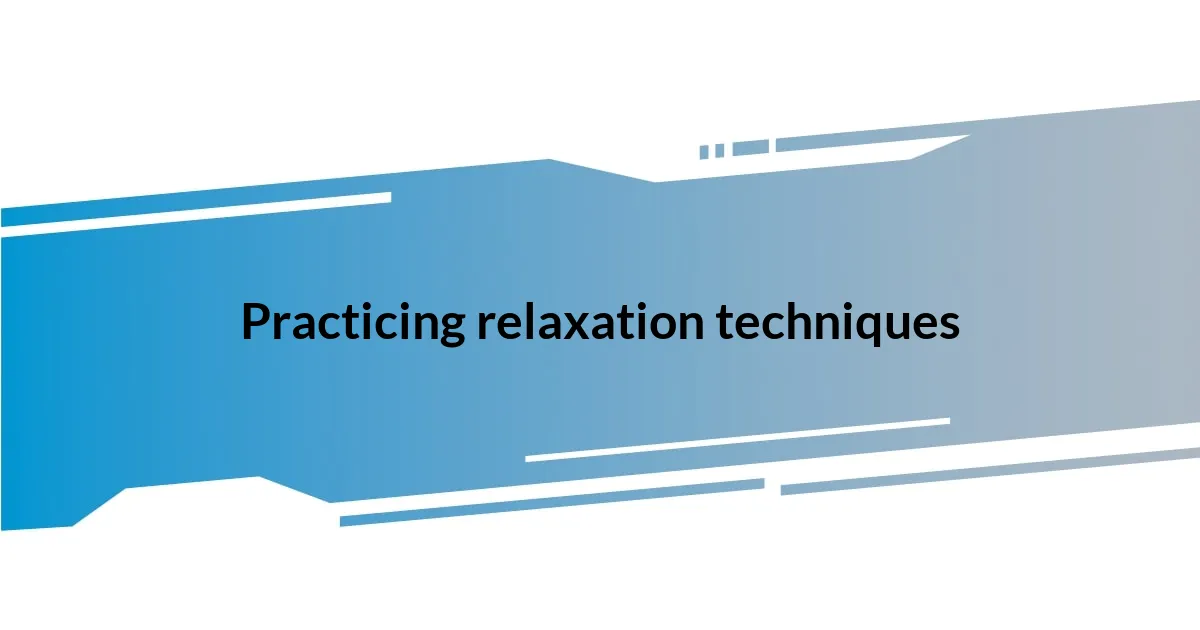
Practicing relaxation techniques
Practicing relaxation techniques has been a game-changer for me. One favorite method is progressive muscle relaxation, where I consciously tense and then relax each muscle group. I vividly remember a time before a big performance when I felt the tension building in my shoulders. By focusing on each muscle, I could physically let go of that anxiety—it was almost like watching a balloon deflate.
Another technique I often utilize is guided imagery. I find that listening to soothing recordings while imagining a peaceful place, like a serene beach or a quiet forest, allows my mind to drift away from the stage. Have you ever had that moment when a deep breath can momentarily transport you to tranquility? For me, it’s during those moments, just before going on stage, that I can fully embrace the calm.
Additionally, I sometimes turn to simple stretching exercises. While backstage, a few gentle movements bring me back into my body and away from my swirling thoughts. Recently, after a heavy bout of nerves, I took just a minute to stretch and found that it energized me for the performance ahead. It’s truly fascinating how even small physical adjustments can significantly impact your mental state.
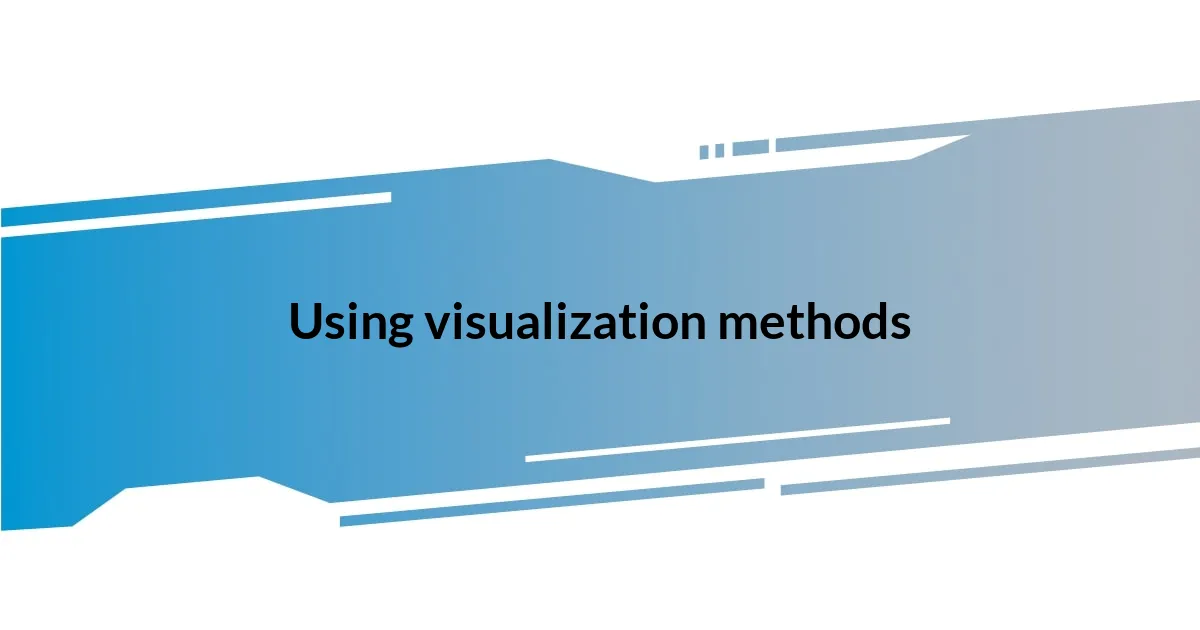
Using visualization methods
Using visualization methods has been a transformative aspect of managing my stage fright. Before stepping onto the stage, I picture myself delivering an engaging performance. There have been moments, like when I imagined the audience laughing at my jokes, that helped me build confidence and set a positive tone for my appearance. This simple but effective technique allows me to anticipate success rather than fear.
I also create vivid mental images of a successful performance flowing smoothly. It’s almost like I’m rehearsing the event in my mind, and with each detail, the anxiety starts to fade. I recall a time when I visualized myself interacting effortlessly with the audience, and when I actually stepped on stage, I surprisingly felt like I had already been there. Isn’t it amazing how our minds can pave the way for our actual experiences?
Interestingly, I sometimes visualize the worst-case scenario as a way to flip the narrative. When I find myself getting anxious, I picture a potential mishap—maybe forgetting my lines—and then I mentally navigate my way through it. I remember once laughing off a little stumble on stage, and replaying that in my mind beforehand turned out to be liberating. It reminds me that it’s okay to not be perfect, and instead, I can embrace the journey with all its ups and downs.
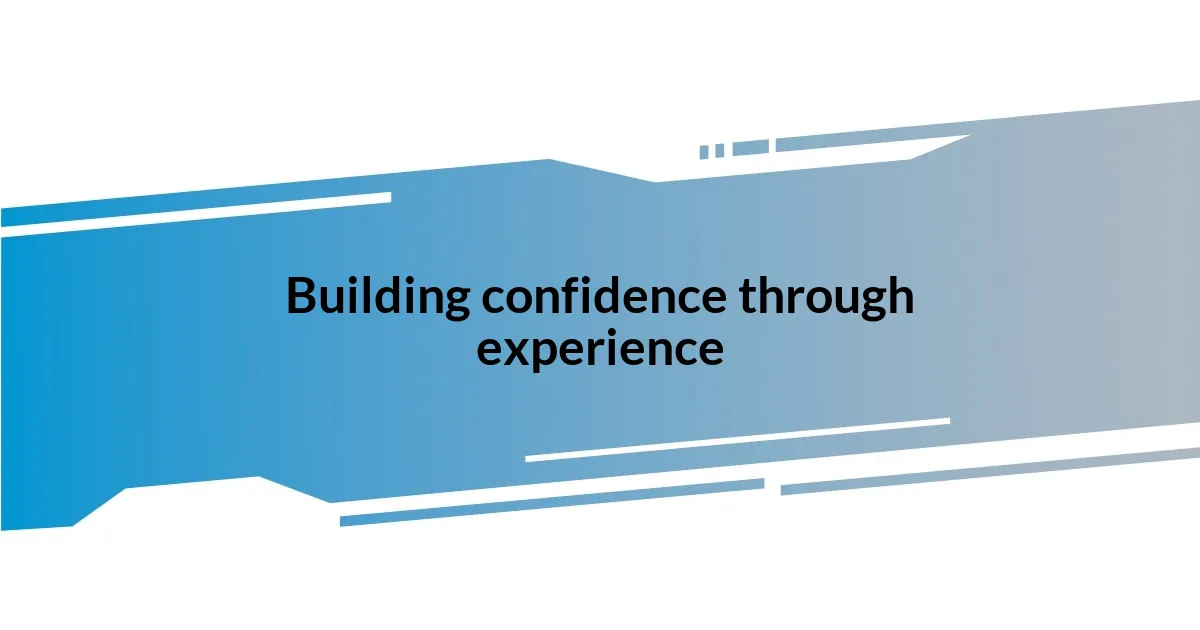
Building confidence through experience
Building confidence through experience truly shapes how I approach public speaking. I remember my first speech at a local event; I was terrified, barely able to string together a coherent sentence. Yet, each subsequent opportunity to speak—whether in small groups or larger audiences—helped me chip away at that initial fear. Have you ever noticed how, with each speaking engagement, your nerves start to settle just a bit? I find that’s a significant part of the growth process.
As I gained experience, I started to embrace the awkward moments. There was a time when I mistakenly referred to my audience as the wrong name—something that would have sent me spiraling into panic years ago. Instead, I turned it into a light-hearted joke, allowing myself to laugh. That moment made me realize that authenticity can be powerful. It’s those little missteps that remind us we’re all human, and acknowledging them can deepen our connection with the audience.
The pivotal moments, though, were when I received feedback from those who listened. A colleague once approached me after a presentation, praising my storytelling ability and mentioning how engaged the audience seemed. Those encouraging words flooded me with confidence. It was a tangible reminder that experience builds not just competence, but confidence. I realize now that every time I step on stage, I’m not just sharing knowledge or stories; I’m sharing a part of myself, and that’s something to celebrate.